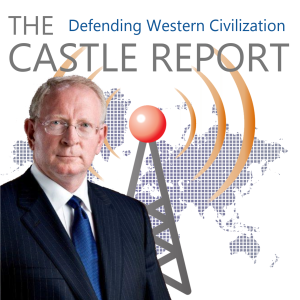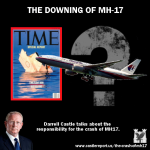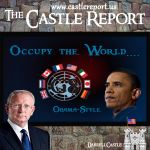
Resetting the Order
Podcast: Download
Darrell Castle endeavors to give his opinion on the subject of tariffs and what they mean for the United States.
Transcription / Notes
RESETTING THE ORDER
Hello, this is Darrell Castle with today’s Castle Report. This is Friday the 11th day of April in the year of our Lord 2025. It’s difficult to leave the subject of war and talk about tariffs but I have been waiting for the wars to pause long enough for me to do it. The wars haven’t cooperated, but I have to pause them for this week since the subject of tariffs can no longer be ignored.
I don’t claim to be an economist but I do know something about economic history so, I will, therefore, endeavor to give an opinion on the subject of tariffs and what they mean for us. I used to study the marketing theory of one of the great marketers in the world today, Dan Kennedy. People would pay handsomely for Dan’s advice and they would often ask him, so what should I do, this or that, and his answer was, yes. In other words, he would advise them to implement all those ideas at the same time. President Trump seems to have adopted that shotgun approach to how he deals with the US economy and its relationship with the world.
The tariff seems to be the base of Trump’s economic program and he has announced the implementation of 10% baseline tariffs on all imports but he has now temporarily paused them for 90 days. My understanding is that all reciprocal tariffs are paused except China which stands at 125%. He said that “yippy” globalists and “queasy” skeptics fueled his decision. I guess that means people were getting nervous and that made him nervous.
Tariffs are a tax on the importers of goods and the people who buy the finished products from the imported goods ultimately pay the tax. True, the buyer is free to not buy but in any event the tax money goes to the government and that explains the idea that tariffs will help reduce the deficit and therefore debt. The problem is that if we think about it the flaw in that reasoning is that increased revenue comes at the cost of decreased production thus offsetting any gains. Tariffs tend to slow down production wherever they are imposed. That is a concept proven time and again by history. The Chinese are a little uppity right now so their 125% tariff stays in place. The UN tells us that China now has 31% of world manufacturing and that is expected to increase to 45% by 2030. The idea then is to spur US manufacturing and that is a good thing but only if people have enough income to afford the products.
Trump asserts that this tariff will correct decades of unfair trade practices that have disadvantaged American workers and industries. Quote from the president; “For too long, other nations have taken advantage of our open markets while imposing barriers to our products. Those days are over.” Think about it like this; a banana republic sells bananas to us and we sell them cars. We import twice as many bananas as that country does cars so there is a trade deficit and we put a 100% tariff on bananas so problem solved. The difficulty is that the banana republic now can’t afford nearly as many cars so it’s self-defeating.
What he is attacking and threatening, then, is the order of the world that has existed since the end of WWll. It’s a globalist order in which the United States controls the world’s access to money with its reserve currency status while foreigners make stuff and exchange it for US debt and a promise to make interest payments on it.
The economic world order alters or changes from time to time as it did with the end of the gold standard in 1971. Things seemed to work well until the first really expensive war collided with the civil rights movement in which millions of additional Americans had to be included in the social fabric of America, its welfare, and its politics. President Johnson talked from time to time about how difficult it was to pay for both at the same time. His biography has many references to the predicament that he was in.
President Nixon found it impossible to do both and the triple blow was the promise of redeeming dollars with gold. His answer was to take the US off the gold standard thus reneging on that promise. Suddenly the dollar was free, almost literally, with no restraints which allowed the nation’s politicians to spend without limit. The debt grew and grew along with the deficits each year until now it is estimated that this fiscal year’s interest payment will be approximately 1.2 trillion.
The US paid a price for being chosen to lead the world and impose our will on it, i.e. you do what we say or we are going to war and that means invasion and regime change. To stay leader in that game the US had to assume a role of uncontrolled military spending and to justify that, the masses had to be pacified. The US lost its way somewhere along that road and I think Trump is trying to find the way back. He might use a meat clever when a scalpel would work but I still think that is what he intends. If you read his book, the Art of the Deal, you can clearly see the tactics.
The rise of the computerized world powered by the internet brought the world together and allowed the oligarchs of the various nations to work together to accomplish globalization. The whole world was globalized and interconnected. US manufacturing was offshored meaning our capacity to make things went to foreign workers because US workers were just too expensive. Gradually, the middle-class jobs disappeared and all those factory jobs had to be replaced with something else. Do you know what the most common job in America is today, well its retail sales.
Those people who once worked in a steel mill as their fathers had done are now working at Walmart, carrying bags in hotels, or selling shoes. Their pay reduced from factory pay which included benefits and retirement, to minimum wage and the reality of constantly moving from job to job. People would be living in abject poverty except for the easy availability of credit because nobody can live on their income. This was a never-ending cycle because the easy credit which meant unlimited fuel for the economy drove prices up and made it even harder. Final result for each formerly middle-class American family was unpayable debt and bankruptcy, then the cycle would start over. Will tariffs bring back American manufacturing and reopen our shuttered rust belt factories, I sure hope they do.
Globalization, as the president sees it then, is other nations taking advantage of America and stealing America’s wealth but the reality is this. Foreigners shipped us cars, clothing, electronic gadgets, medicine, etc. and the US shipped them debt securities, blips on computer screens, and a promise that those blips could buy things. In other words, they made our goods and we gave them I.O.Us. as debt, which was a burden born by the hard-working American taxpayer. America lost its status as the world’s largest exporter and instead exported mostly debt. That debt has to be paid eventually by someone and that eventually is fast approaching.
Some of the things we import in great numbers are vital to the American people. The product I’m thinking of is antibiotics which is almost exclusively made in China now. The other things which are vital to the nation are not as vital to each person as being able to cure an infection in one’s body. Things such as computer chips and the all-important rare earth minerals without which the electronic gadgets could not work. Perhaps that is why Trump is trying so hard to secure Ukraine’s rare earth deposits for the US.
China’s economy is more dependent on the United States than the US economy is dependent on China but that doesn’t mean China will go away peacefully. One tactic is selling US treasuries thus making them worth less and driving up the cost of refinancing the roughly 9 trillion dollars of debt which must be refinanced very soon. China has also been able to reduce its total exports to the US to around 15%. It managed to do that by transshipping goods through Vietnam, Thailand, and other Southeast Asian countries. That’s probably why the Trump team told the Vietnamese that even reducing their tariffs to zero would not be enough.
The reciprocal tariff for Vietnam was 46% before the pause. I have a list here in front of me of every country in the world and only the big trading partners are being heavily taxed and the vast majority of countries are 10%. Even most of Europe is 10% but the Europeans are the enraged ones second only to China. I suspect that the real reason for the Chinese uncompromising attitude is that to just accept an equitable tariff with all this publicity would be an admission that the world order still puts them below the US and they are not willing to admit that to the world. The Europeans, on the other hand, just want things to continue as they are.
The Europeans talk about war and bluster with paranoia regarding Russia, but they expect the United States to pay for it. The American people have made it clear that they want an end to these wars and that they can’t see any US purpose in fighting them. The administration said that some 70 countries have contacted US trade officials to negotiate reduced tariffs and most have offered to reduce their tariffs on American goods to zero. Would reducing tariffs worldwide to zero be a good thing for everybody.
I’m not sure because it seems to me that it would further degrade US manufacturing thus driving down wages even further but zero tariffs are apparently not his intent. Would zero tariffs make for a more peaceful world. Maybe, and if so perhaps it would be worth it. I’m not sure how sustainable the US economy can be when it is based almost entirely on buying things that others make in exchange for ever increasing debt.
Trump also used the tariffs as a weapon to intimidate countries into doing what he demands. He used high tariffs against certain countries in Latin America to force them to repatriate their criminals which he wanted deported. That tactic worked against small, weak countries but I doubt if it would work against more powerful countries like China.
Finally, folks, if resetting the world order economically can be accomplished by tariffs to make the world a more peaceful place to live, work and raise our families that would be a good future. I hope and pray that it is so.
At least that’s the way I see it,
Until next time folks,
This is Darrell Castle,
Thanks for listening.




